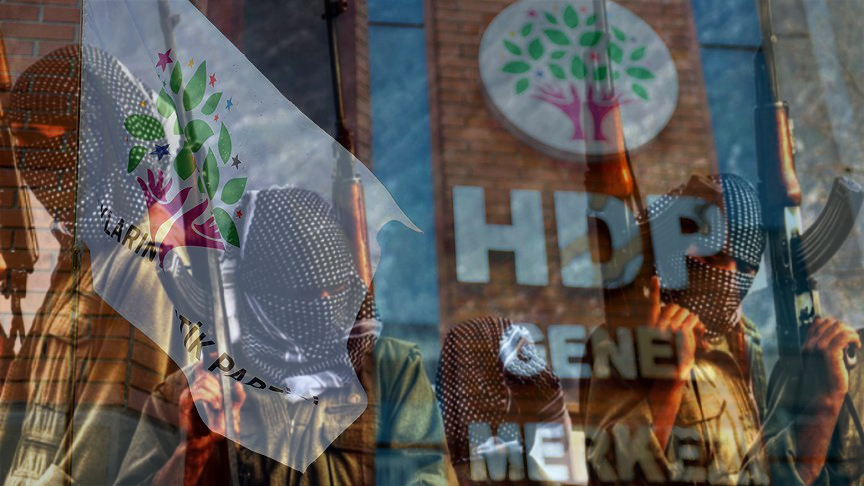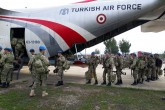The oppositions’ presidential candidates, i.e. Muharrem Ince, Temel Karamollaoğlu and Meral Akşener, are calling for the release of Selahattin Demirtaş, who is supported by the Peoples’ Democratic Party (HDP), from prison. Obviously, their goal is to lure some of the HDP voters away in the first round in order to finish second. They hope to beat incumbent President Recep Tayyip Erdoğan with the HDP’s support. The Republican People’s Party (CHP) seems more eager to go down this path, while the Good Party (İP) treads carefully to avoid angering its nationalist base.
The CHP has adopted a two-dimensional campaign strategy. The first is related to the various tactical moves made to influence voter behavior. Having failed to include the HDP in the Nation Alliance due to the İP’s objections, the CHP wants to make the HDP base more attractive to urban voters. This is why many leftists have been excluded from the CHP’s candidate list for the parliamentary race, whereas the HDP has simultaneously reached out to prominent figures within the Turkish left.
The second dimension refers to the CHP’s audacious move to call for a peaceful solution to the Kurdish question under the roof of Parliament. It was noteworthy that the movement pledged to provide native-language education and adopt the “European Charter on Local Self-Government.” The withdrawal of the various reservations made in 1991 would make it possible for local governments to organize their internal structures, use financial resources and conduct external relations autonomously. At the same time, the document imposes restrictions on the central authority’s monitoring powers.
In this sense, the CHP’s pledge goes beyond showing some courage to tackle the Kurdish question. It not only shows complete disregard for Turkey’s own experiences with disarmament talks but also fails to take into account that autonomy is no longer feasible in many countries, including Spain. The cases of Catalonia and Northern Iraq suggest that granting autonomy to a given region only promotes a separatist identity and politics.
In other words, autonomy leads to territorial disintegration rather than democratization. No wonder why some former CHP heavyweights have complained that their party’s push for autonomy might lead to federalism and territorial disintegration. Having witnessed what happened during Turkey’s rapprochement process, the CHP promises to take certain steps that the Spaniards came to regret.
Let us also recall that the terrorist organization PKK and the HDP abused the peace process until July 2015. The memories of PKK-HDP pressure backed by violence, fear and threats are still fresh in southeastern Turkey. Local communities expect the authorities do not allow the terrorists to exert the same kind of pressure on them in future.
Many Kurds in the region are frustrated with the HDP due to past pressures and the collapse of the peace process due to “trenches.” At the heart of the HDP’s marginalization lies this anger.
The same anger translates to popular support for counterterrorism operations at home as well as in Syria and Iraq. Until Turkey thwarts PKK efforts to create a “statelet” in Northern Syria, the CHP’s promise to withdraw Ankara’s reservations won’t serve the prospect of a solution.
Quite the contrary, the main opposition party would only save the PKK and the HDP from the margins of politics – where they have been imprisoned since July 2015.
Efforts by the opposition presidential candidates and the main opposition CHP to save the HDP from the margins do not represent an ordinary act of “normalization.” Nor is this a brand of populism geared towards scoring points with voters. After all, the HDP leadership has failed to distance itself from the forces that pushed it to the margins in the first place. The movement’s position on “trench warfare” or PKK violence remains unchanged. In a recent interview with Fox TV, HDP co-chairwoman Pervin Buldan not only refused to describe the PKK as a terrorist organization but also came out in favor of “trench warfare,” which, she said, made it possible for local residents to defend themselves.
Trying to save the HDP from the margins of the political arena despite its unwillingness to undergo a major transformation would undermine Turkey’s fight against terrorism. Such actions will encourage the advocates of violence and separatism rather than supporters of peaceful coexistence. Under the circumstance, one cannot help but wonder whether CHP politicians understand what they are trying to accomplish.
[Daily Sabah, 4 June 2018]
In this article
- Opinion
- 1991
- 2015
- 2018
- 2018 Elections
- CENTCOM
- Counterterrorism
- DAESH
- Daily Sabah
- Donald Trump
- Early Elections in Türkiye
- East of the Euphrates
- Europe
- Fight against DAESH
- Fight Against Terror
- HTS
- Iraq
- Kurdish Community
- Kurdish Question
- Kurdistan Workers' Party Terrorist Organization (PKK)
- Middle East
- Muharrem Ince
- Nation Alliance
- NATO
- NATO Ally
- Normalization
- Northern Iraq
- Operation Euphrates Shield
- Opposition
- Peace Corridor
- People's Protection Units (YPG)
- PKK - YPG - SDF - PYD - YPJ - SDG - HBDH - HPG - KCK - PJAK - TAK - YBŞ
- Recep Tayyip Erdoğan
- Safe Zone
- Selahattin Demirtaş
- Snap Elections
- Spain
- Syria
- Syrian Civil War
- Syrian Conflict
- Syrian Crisis
- Syrian Democratic Forces (SDF)
- Syrian National Army (SNA)
- Syrian National Coalition
- Syrian Opposition
- Syrian Refugees
- Terrorism
- The President of the Republic of Türkiye
- Trump’s Syria Withdrawal
- Turkish Foreign Policy
- Turkish President
- Turkish-American Relations
- Türkiye-US Relations
- Türkiye-US Security Relations
- Türkiye's Elections
- Türkiye's Elections 2018
- Türkiye's Foreign Policy
- Türkiye's Good Party (IP)
- Türkiye's Operation Peace Spring
- Türkiye's Peoples' Democratic Party (HDP)
- Türkiye's Republican People's Party (CHP)
- Türkiye’s Operation Olive Branch
- United States (US)
- US Withdrawal from Syria
- US-PKK/PYD/YPG/SDF Relations
- US-Terror Relations
- Vladimir Putin



